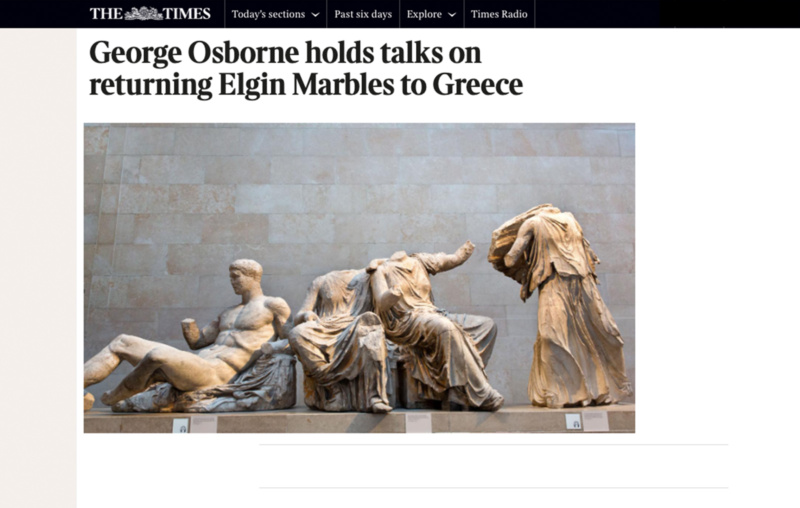George Osborne has held secret talks with the Greek prime minister to negotiate the return of the Elgin Marbles from the British Museum.
The former chancellor, the museum’s chairman, has also met two other senior Greek ministers in London since being appointed last year to discuss repatriating the 2,500-year-old Parthenon sculptures to Athens.
Osborne, 51, met Kyriakos Mitsotakis, the Greek leader, at a five-star hotel in Knightsbridge, west London, on Monday and the fate of the sculptures was the only topic on the agenda. The pair first held “exploratory talks” in November last year at the Greek ambassador’s Mayfair residence, according to Ta Nea, an Athens newspaper.
The talks raise the prospect that one of the most bitter and longest-running cultural disputes may be resolved after more than 200 years. The marble frieze was removed from the Parthenon in Athens in 1801 under the orders of the seventh Lord Elgin, who was Britain’s ambassador to the Ottoman empire, with, he said, the permission of the occupying authorities.
Elgin sold the marbles to the UK government in 1816 and their ownership was soon transferred to the British Museum’s trustees. More than 75 metres of the Parthenon frieze, as well as 17 pedimental figures, have been housed at museum in London ever since and are regarded as one of the most important parts of its collection.
The Greek government first made a formal request for the return of the sculptures in 1983. The museum’s longstanding position has been that it is happy to consider loans of objects to countries that do not claim ownership of them. Athens has rejected suggestions that it would borrow the marbles, as that would implicitly acknowledge British ownership of them.
Boris Johnson and Liz Truss both rejected the idea that the marbles would be returned to Greece while they were prime minister. However, Osborne indicated in June that he was prepared to shift from a hardline approach. He said “there is a deal to be done” over the marbles, if Britain and Greece “approach this without a load of preconditions, without a load of red lines”.
In July Jonathan Williams, the museum’s deputy director, called for an “active ‘Parthenon partnership’ with our friends and colleagues in Greece”.
A deal may include returning the sculptures to Athens, where Greece has built a museum to house them, in exchange for other treasures being lent to the British Museum.
Meetings between Osborne and Greek ministers are the clearest indication yet that a deal may be close. The latest round of talks took place , shortly after Mitsotakis was received by the King at Windsor Castle.
Speaking four hours after his meeting with Osborne, Mitsotakis said at the London School of Economics that the return of the marbles was “possible” and he had seen “progress” on the issue.
“A win-win solution can be found that will result in the reunification of the Parthenon sculptures in Greece, while at the same time taking into account concerns that the British Museum may have,” he said.
A Greek source told Ta Nea: “ The devil is in the details. An agreement is 90 per cent complete, but a critical 10 per cent remains unresolved. It’s hard to get there but it’s not impossible.”
The source added: “Significant progress has been made. We will see in the coming months if that progress is enough to reach an agreement.”
Another source said the museum was not planning to restitute any objects, because it lacks the legal power to do so, but was seeking “new and imaginative partnerships”.
As well as meeting Mitsotakis twice, Osborne also met Nikos Dendias, the Greek foreign minister, in October, and has also discussed the situation with Giorgos Gerapetritis, one of the prime minister’s closest aides. It is understood that the requests for meetings came from the Greek side.
Polling shows that a majority of Britons support returning the sculptures to Greece. Some 53 per cent of adults said they should be repatriated, according to YouGov, while 24 per cent said they did not mind either way.
The British Museum did not deny that Osborne had held talks with Mitsotakis. It would “talk to anyone, including the Greek government,” about taking forward a new Parthenon partnership. “We operate within the law and we’re not going to dismantle our great collection, as it tells a unique story of our common humanity. But we are seeking new positive, long-term partnerships with countries and communities around the world, and that of course includes Greece.”
How Can You Get Involved?
If you would like to join the efforts to reunite the Parthenon Sculptures in Greece through a cultural partnership and receive emails with campaign updates from Pagefield Communications, please subscribe below.
For press enquiries, please contact Pagefield Communications at parthenonproject@pagefield.co.

